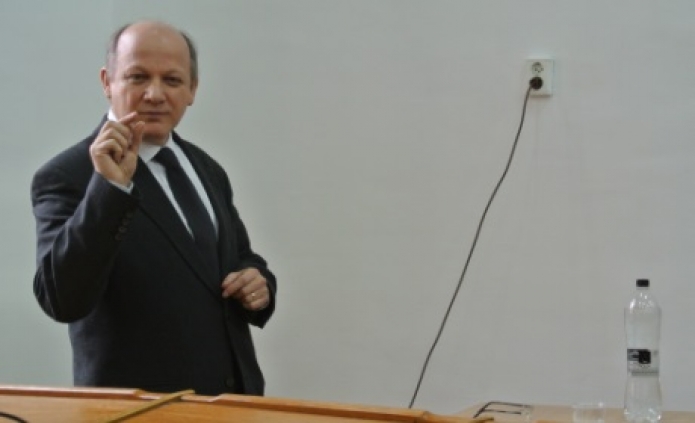The dissertation submitted at the Faculty of History and Philosophy of the Babeș-Bolyai University deals with the problem of forgiveness in the works of the French moral philosopher, Vladimir Jankélévitch.
S. Béla Visky defended his doctoral thesis in philosophy

The event took place on November the 7th, 2013. The thesis, taking the earlier research topic of the author, the problem of theodicee, one step further, may be considered as its follow-up and its second episode. The title of the dissertation is The Problem of Forgiveness in the Moral Philosophy of Vladimir Jankélévitch. While suffering and the rethinking of traditional presentations of divine omnipotence in the light of I. Kant's "radical evil" stood in the focus of the first (theological) thesis of Visky, his second work concentrates on the only possible gesture able to really encounter the evil deed: forgiveness, its possibility and impossibility. The thesis is divided into six chapters. The first chapter deals with the life of Jankélévitch, the results of recent research on his scholarly activity, as well as some of the basic issues of his moral philosophy. The second chapter focuses on the problem of forgiveness as this appears in Jankélévitch's works, Le pardon and Pardonner? The third chapter analyses the dispute around the issues raised by Jankélévitch, appearing in an specific issue of The Times magazine published in the year Jankélévitch's death. Chapters four and five focus on the reception of Jankélévitch by J. Derrida and P. Riceur. The final chapter summarises the main results of the research.
Vladimir Jankélévitch was one of the most significant thinkers of the 20th century. He was born in Bourgesban, in Middle-France on August the 13th, 1903, in a family with russian-jewish roots. His father was a renowned doctor who also translated some works of Hegel and Freud into French. Vladimir studied philosophy in the most famous institute of Paris, École Normale Superieur. Between the two world wars he lectured at the French Institute of Prague and some other universities in France. He participated in the revolts against the German invaders, when he gets injured. During his stay at the hospital he writes his work on lying (De mensonge). He barely escapes being arrested by the Gestapo. The eliberation of the city on 19. August 1944 is for him a miracle. The war and the holocaust has deeply impressed him. The memories of survivors follows him all along his way, especially the infinit and unintelligible eventuality of his own survival.
Vladimir Jankélévitch died on 6 June 1985 leaving a rich heritage of philosophical and musicological essays behind. Most of his works have been translated into several languages. Five of his philosophical works are also accessible in Romanian, yet none of his works have as yet appeared in Hungarian. The current research can also be considered as an important step in fulfilling this unreasonable hiatus.